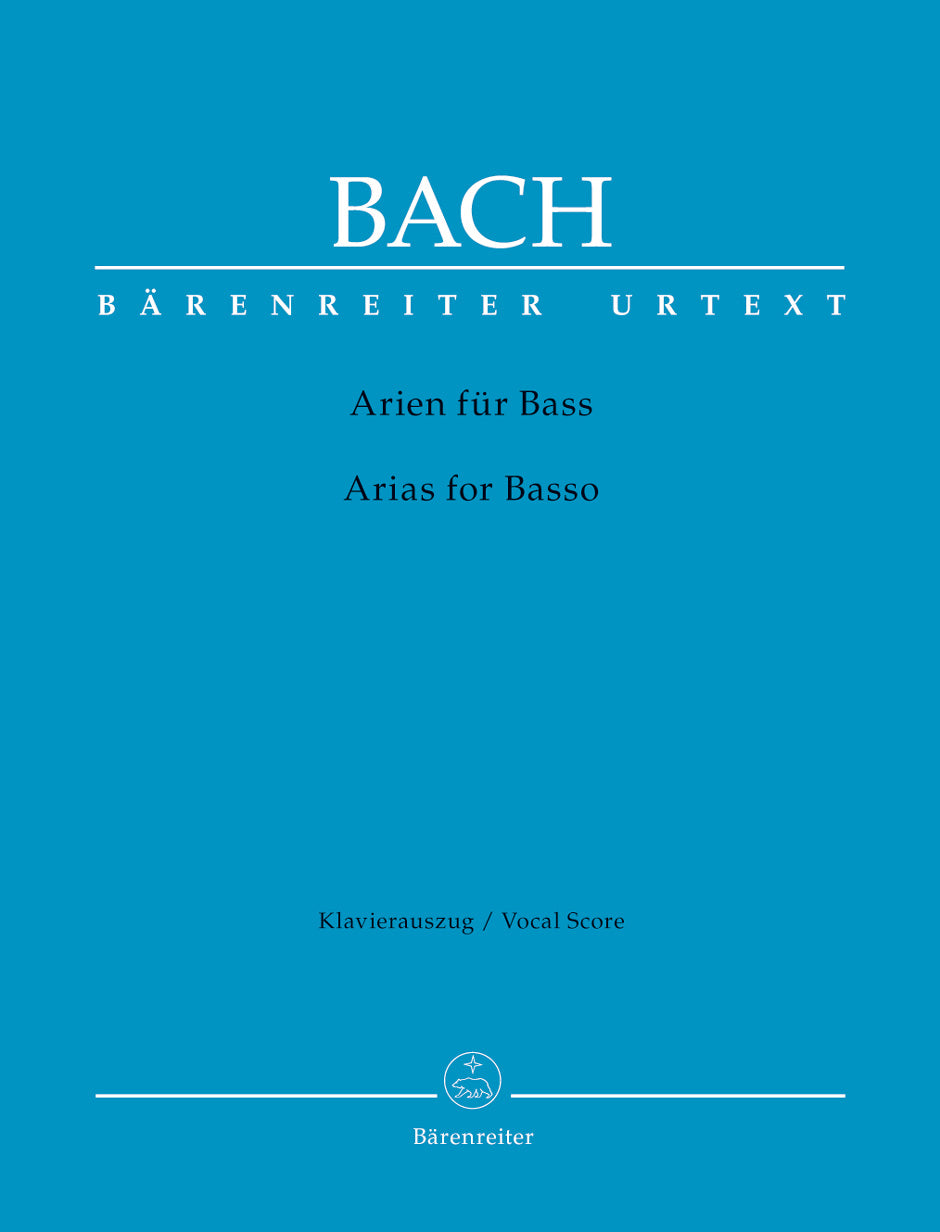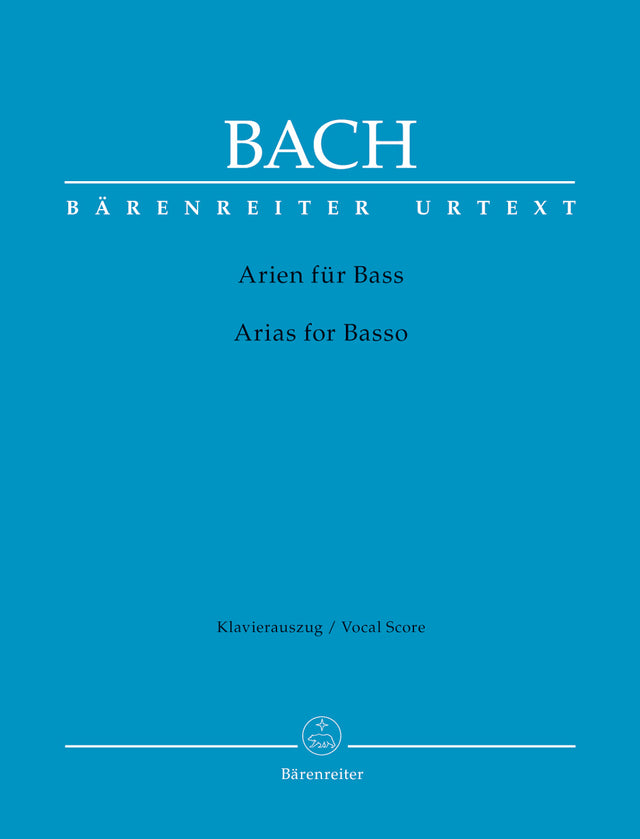Bach: Arias for Bass
In stock and typically ships within 1 business day.
- Composer: Johann Sebastian Bach (1685-1750)
- Editor: Charlotte Lehmann
- Piano reductions: Stefan Müller, Eike Wernhard
- Instrumentation (this edition): Piano Reduction, Bass
- Originally for: SATB Choir, Soprano, Orchestra, Bass, Tenor, Chamber Orchestra
- Work Languages: English, German
- ISMN:
- Size: 9.1 x 11.8 inches
- Pages: 81
- Urtext / Critical Edition
Description
ln recent decades Bach's cantatas have gained enormous popularity and entered the repertoires of many singers. These volumes present characteristic arias from Bach's huge output of cantatas for all four vocal ranges - soprano, alto, tenor and bass -together with helpful advice on how to learn them. The accompanying booklet in German and English not only contains preparatory exercises but also offers background information on style, technique and performance practice.
Works:
- Ich folge Christo nach from Weinen, Klagen, Sorgen, Zagen (Cantata for the Sunday Jubilate), BWV 12
- Gute Nacht, de Weltgetümmel from Wer weiß, wie nahe mir mein Ende (Cantata for the 16th Sunday after Trinity), BWV 27
- Höllische Schlange, wird dir nicht bange from Darzu ist erschienen der Sohn Gottes (Cantata for Christmas 2), BWV 40
- Ja, ja, ich kann die Feinde schlagen from Selig ist der Mann (Cantata for the 2nd Day of Christmas), BWV 57
- Ach, soll nicht dieser grosse Tag from Wachet! betet! betet! wachet! (Cantata for the 26th Sunday after Trinity), BWV 70
- Seligster Erquickungstag from Wachet! betet! betet! wachet! (Cantata for the 26th Sunday after Trinity), BWV 70
- Ach, unser Wille bleibt verkehrt from Herr, wie du willt, so schicks mit mir (Cantata for Epiphany III), BWV 73
- Herr, so du willt from Herr, wie du willt, so schicks mit mir (Cantata for Epiphany III), BWV 73
- Ich habe genug from Ich habe genug (Purification of the Blessed Virgin Mary), BWV 82
- Schlummert ein, ihr matten Augen from Ich habe genug (Purification of the Blessed Virgin Mary), BWV 82
- Fürwahr, wenn mir das kömmet ein from Herr Jesu Christ, du höchstes Gut (Cantata for the 11th Sunday after Trinity), BWV 113
- Der alte Drasche brennt vor Neid from Herr Gott, dich loben alle wir, BWV 130
- Hat man nicht mit seinen Kindern from Schweigt stille, plaudert nicht ("Coffee Cantata"), BWV 211
- Kron und Preis gekrönter Damen from Tönet, ihr Pauken! Erschallet, Trompeten! (Congratulatory Cantata), BWV 214
Publishers use a lot of words to describe what they sell, and we know it can be confusing. We've tried to be as clear as possible to make sure you get exactly what you are looking for. Below are descriptions of the terms that we use to describe the various formats that music often comes in.
Choral Score
A score for vocalists that only contains the vocal lines. The instrumental parts are not there for reference. Generally, cheaper than a vocal score and requires multiple copies for purchase.
Facsimile
Reproductions of the original hand-written scores from the composer.
Full Score
For ensemble music, this indicates that the edition contains all parts on a single system (there are not separate parts for each player). In larger ensembles, this is for the conductor.
Hardcover
Hardbound. Generally either linen-covered or half-leather.
Orchestral Parts
Similar to a wind set, this is a collection of parts. In the case of strings, the numbers listed are the number of copies included, though generally these are available individually (often with minimum quantities required).
Paperback
When publishers offer multiple bindings (e.g. hardcover) or study scores, this is the "standard" version. If you're planning to play the music, this is probably what you want.
Performance / Playing Score
A score of the music containing all parts on one system, intended for players to share. There are not separate parts for each player.
Set of Parts
For ensemble music, this indicates that there are separate individual parts for each player.
Solo Part with Piano Reduction
For solo pieces with orchestra, this is a version that contains a piano reduction of the orchestra parts. For piano pieces, two copies are typically needed for performance.
Study Score
A small (think choral size) copy of the complete score meant for studying, and not playing. They make great add-ons when learning concertos and small chamber works.
Vocal Score
A score prepared for vocalists that includes the piano/organ part or a reduction of the instrumental parts.
Wind Set
For orchestral music, this is a collection of wind and percussion parts. The specific quantities of each instrument are notated.
With Audio
In addition to the printed music, the edition contains recordings of the pieces. This may be an included CD, or access to files on the internet.
With / Without Fingering (Markings)
Some publishers prepare two copies - a pure Urtext edition that includes no fingering (or bowing) suggestions and a lightly edited version that includes a minimal number of editorial markings.



